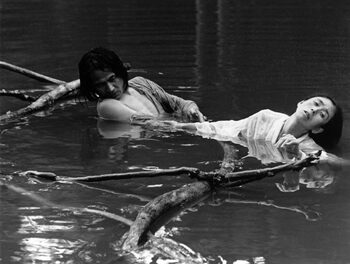The Mallarmé Chamber Players‘ annual fund-raising gala displayed its broadly-conceived mandate at its best. The Mallarmé Chamber Players consist of a fluid ensemble of musicians drawn locally as well as nationally. They broadly define “chamber music,” allowing them to explore the whole of world music, not just the core of the traditional repertoire. The gala soirées take place in local private homes. This fascinating concert explored four recent and very different compositions by T. J. Anderson and took place literally throughout the lovely home of soprano Louise Toppin. The sold-out audience was distributed in two downstairs rooms and on an upstairs landing.
Thomas Jefferson Anderson (b.1928) studied composition with George Ceiga, Philip Bezanson, Richard Hervig, and Darius Milhaud. He served as Chairman of the Department of Music at Tufts University for eight years and in 1990 became Austin Fletcher Professor of Music Emeritus. Anderson is famous for his orchestration and revival of Scott Joplin’s opera Treemonisha, premiered in Atlanta in 1972. Besides his own operas – Soldier Boy, Soldier and Walker and Slip Knot – Anderson has a long list of diverse works. In amusing and insightful comments before and after the 45-minute concert, the composer said he had explored the broad range of African-American styles and took pride in bringing the experiences of Black Americans to the concert stage. He draws upon the full range of options available in the quiver of a contemporary composer from Baroque to Serialism while synthesizing elements from the eastern and western classical traditions.
The concert opened with an intriguing, short work, “In Memoriam Peter Gomes” (2010), for viola. Gomes, often called “Harvard’s pastor,” was an American Baptist minister who had a profound influence upon Anderson. Gomes was active in support of the broad range of civil rights and in the anti-war movement. Performer Jonathan Bagg said it was the least lugubrious elegy score he had ever seen or heard. Anderson said he selected the viola because it fit the vocal range of Gomes. The work explores the full range of the viola from its lowest notes to some surprisingly high ones. There are technical challenges, trills, double-stops, and a rich variety of bowings, but they don’t draw unnecessary attention to themselves.
My two least favorite instruments are the accordion and the xylophone. The former was ubiquitous on the old Ed Sullivan Show, which my parents never missed. The next work, “Riffs” (1910), is for solo accordion, an instrument whose possibilities fascinate Anderson. The free online dictionary defines a “riff” as a “short rhythmic phrase, especially one that is repeated in improvisation.” The composer said he made use of the old gospel hymn, “No More Auction Block for Me,” composed shortly after the abolition of slavery. After a recent performance at Carol Woods Retirement Community, Anderson said a listener had accused performer David DiGiuseppe, this concert’s soloist, of “improvising.” The composer said he had aimed all his life for works which “sounded improvised” in performance but asserted that every single note DiGiuseppe played was in his score. The short riffs are attractive and longer phrases often take unexpected turns. Rests and silences play important roles. The composer said he expected his listeners to work, not just sit back and listen passively. More than once I wondered how this piece would work transcribed for organ. There were waves of sound that reminded me of the great wash of sounds in some modern organ works.
The last two works were much longer and more substantial. Boogie Woogie Fantasy (1997) for piano is immediately attractive and engaging and was played superbly by Thomas Warburton who had premiered the work in honor of Anderson’s 70th birthday at Duke University. The pianist brought out a broad palette of tone and a vivid sense of rhythm. Toppin’s white piano matched her music room’s décor beautifully when it could be seen. Sound was never a problem in such an intimate setting.
Anderson is skilled at setting the words of poetry to music. Mallarmé Gala attendees got a sneak preview of Cornerstones: A Song Cycle for Soprano and Piano (2010) using poetry by Elye Alexander. Its formal premiere will take place in a few weeks at a Tufts University concert honoring Anderson. The performers were soprano Louise Toppin and pianist Warburton. No texts were given, but Toppin’s diction made the words clear and bright. The piano part is very engaging and richly rewarding. At times I was reminded of Alban Berg’s style while some aspects reminded me of performances of Schoenberg’s Pierrot Lunaire, not so much that work’s poetry but a “more sung” version of the Viennese composer’s Sprechstimme (sung speech). Sometimes the combined color and pitch of the keyboard and singer distracted from perceiving the specific words. The quality of the work ought to justify many repeat performances.











